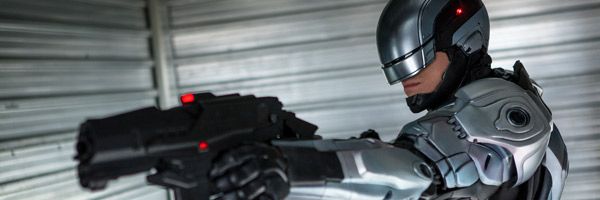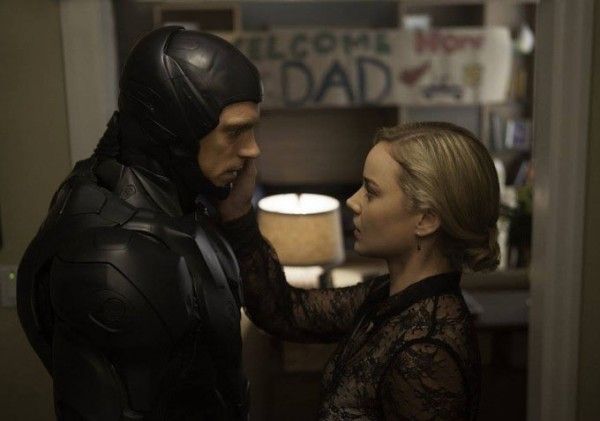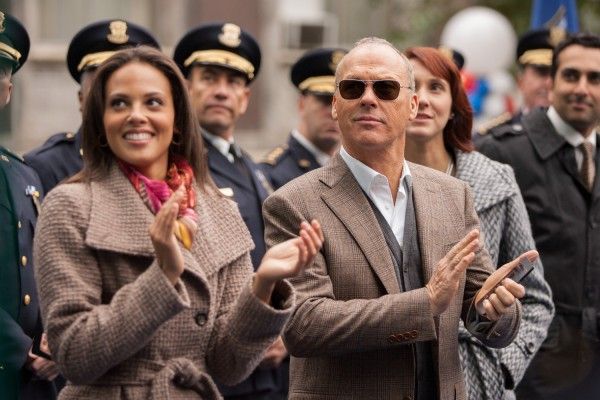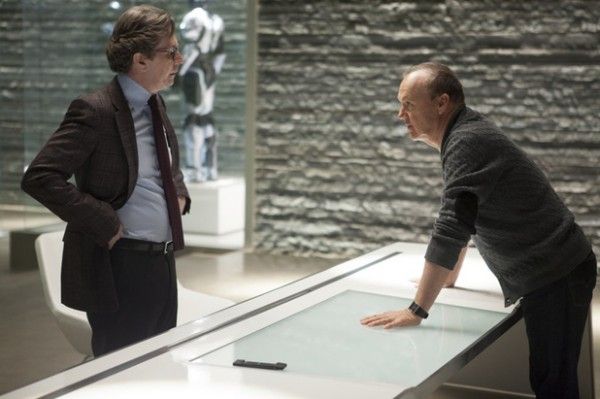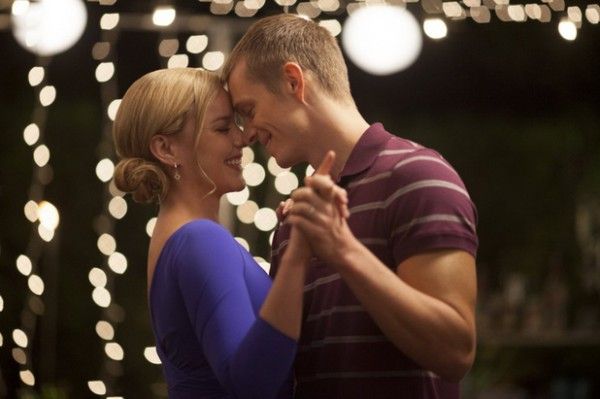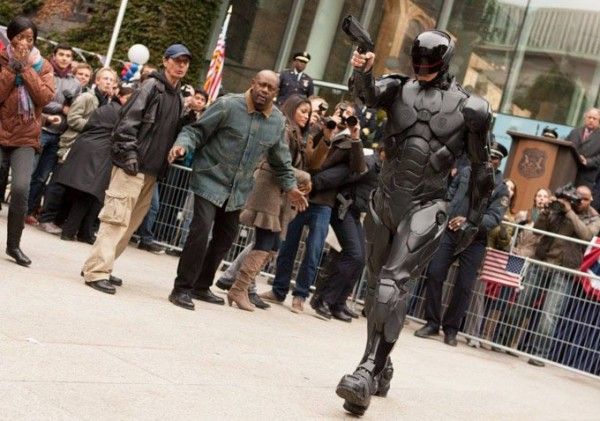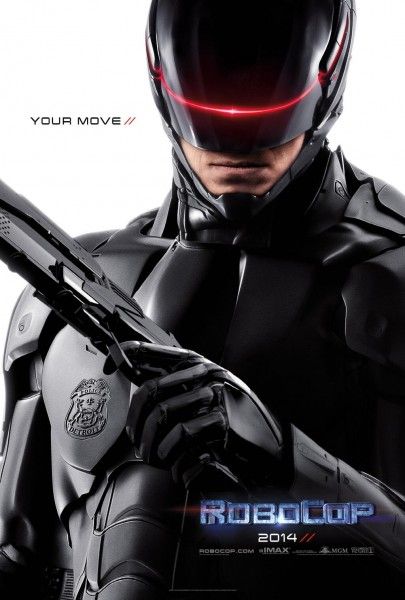From director José Padilha, this re-imagining of RoboCop is set in 2028, with OmniCorp as the world’s leader in robot technology. When loving husband, father and honest cop Alex Murphy (Joel Kinnaman) nearly dies, OmniCorp sees an opportunity to build a part-man, part-robot police officer that will not only stop crime and corruption in Detroit, but reap billions for their company. The film also stars Gary Oldman, Michael Keaton, Abbie Cornish, Jackie Earle Haley, Michael K. Williams, Jennifer Ehle, Jay Baruchel, Marianne Jean-Baptiste and Samuel L. Jackson.
During a press conference at the film’s press day, actor Joel Kinnaman talked about the challenges of acting through such a heavy suit, what sold him on this particular remake, what it was like to get to say some of the lines from the original film, and working with The Wire’s Michael K. Williams, while Gary Oldman talked about how he found his character, and Michael Keaton talked about his own experience acting through a suit for Tim Burton’s Batman. Check out what they had to say after the jump, and be aware that there are some spoilers.
Question: Joel, what were the challenges in dealing with the suit?
JOEL KINNAMAN: It was a little bit of a challenge to put on the suit. The first time I put it on, we were out in Pasadena and it was a hot day in L.A. It took one hour and 45 minutes to put it on, and it was so uncomfortable. It was digging in everywhere. It was pressing down on my shoulders. I was just sweating like a pig. After 20 minutes, I said, “I’ve gotta get out of this!” And then, I was thinking to myself that it was a daunting idea that I was going to have to wear this for 14 hours a day, six days a week for five months. But actually, the suit became one of the first seeds that led my imagination into the vulnerability that Alex Murphy felt, after he became RoboCop. It was an interesting contrast because he’s got this body that is so powerful, but he feels very uncomfortable. He’s amputated from his throat down. He doesn’t know who he is anymore. And my little level of uncomfortability led me to think about what Alex would have felt, times a thousand. I was surprised to realize that the suit, which should make me feel so powerful, actually made me feel vulnerable. That was interesting.
Many of the most emotionally demanding scenes, I had to be completely still, especially in the scene when I wake up and Dr. Norton reveals what’s left of me. If you think back to the moments when you’ve gone through the most pain in your life, or the most severe anxiety, your body is very much involved in that. Your body is expressing those emotions. So, when we, as actors, try to access those feelings, the body is a great tool to use. You clench your stomach or you do something physical, and that helps your emotions, along the way. In this instance, I didn’t have that luxury, so there was a higher level of difficult. But what helped me out was that, during most of these scenes, I could look into the truthful eyes of Mr. Oldman.
Michael, having gone through an experience playing a character where you had to work with only a small portion of your face showing, did you have any conversations with Joel Kinnaman about the limitations of that?
MICHAEL KEATON: Yeah, we had a conversation [today]. I saved it for him. I mean, I think I mentioned it to him once. I find talking about acting often is not very interesting and very self-involved. So, without making a big deal about it, he’s really a fine actor. This cast is so good. It really pays off, with every scene. You actually feel something. Usually, in movies, you don’t feel real emotion, but this cast is so good, on every level. And Joel’s job is particularly difficult. People don’t know how hard it is to do what you need to do. Your natural instinct might be to say, “I’m in this suit,” that out of context, is ridiculous. Your inclination or desperation might make you want to go out there. What he didn’t do was that. What he did do was suck back and go inside. He makes these unbelievable transitions from being human to being robot, and then being robot and human, and that’s really, really hard to do when you’re wearing a big black suit. I was really knocked out by it, and I was knocked out by the movie. I kept watching him in it. It’s really extraordinary, what he did. He probably won’t get the credit, for the degree of difficulty that was required.
A long time ago, when I did the first Batman, I just worked the suit. I let that suit go to work for me. I’m very claustrophobic, and we didn’t know if the suit was even going to work at all, until hours before we were about to start shooting in the suit. We had shot all the Bruce Wayne stuff, which was the key. I never worried about the Batman thing. The way in was Bruce Wayne. That was always it for me. I didn’t know what I was going to do with the Batman thing. So, when I got in it, I went, “Oh, I’m in trouble, man. I’ve gotta face this thing.” You couldn’t get out of it. The second one, I could get out of. In fact, [the first one] didn’t totally work. [The movement] really was practical. It really came out of the fact that, the first time I had to react to something, I [turned my head] and the whole thing [ripped open]. There was a big fucking hole. So, I was like, “I have to get around that ‘cause we’ve gotta shoot this son of a bitch.” I said, “You know what, Tim [Burton]? He moves like this.” That’s what I did. So, I’m very, very claustrophobic and I was in that [suit].
At Pinewood, they actually used one of those old boards that they put you on, if you’re playing a knight. I drink a lot of coffee, I eat a ton of vitamins and I drink a lot of water, but I could do none of that ‘cause I couldn’t get out of it to go to the bathroom. They put me in the thing, and I literally started having panic attacks inside. I’d had a little bit of history with that. So, I thought, “I don’t know how I’m gonna do this, man. I’m feeling really scared.” And then, it hit me. I was like, “This is perfect! It’s designed for this really unusual dude. Bruce Wayne has this other personality that’s really dark and really alone and really depressed. This is it. I’ll just take all that stuff that suit is giving me. I’ve got it! I know exactly how to do this now.” It’s odd, how those things happen to actors. A thing where you think, “I have no idea how to do this,” something will happen in your life comes up and you just get it. I don’t know how you get it, but actors are pretty extraordinary, in that regard. I think it’s fear that happens.
GARY OLDMAN: I had all of that in The Dark Knight, and I wasn’t wearing the suit.
KEATON: Forget everything I just said.
KINNAMAN: I got no sympathy from Michael Keaton, when I was complaining about my suit. He was like, “Shut the fuck up! They had to glue my suit on!”
KEATON: He had air conditioning in it.
OLDMAN: The great thing about having been in a lot of make-up, and stuff like that, is that when you’re working with someone who’s in it, and you’ve been there and done it, but you’re not in it anymore, you feel so good.
KEATON: You feel so great! I know!
OLDMAN: You say things like, “Are you hot in that?”
KEATON: I enjoyed every minute of watching [Joel] in the suit. I just sat there.
Gary, how did you get into this character. Did you think of Dr. Frankenstein, at all?
OLDMAN: Yeah. It has echoes of Frankenstein’s monster. It’s an unusual relationship because it’s more patient-doctor than monster-scientist. It’s also like a father-son relationship. They’re friends, and then it’s more like father-son. I think there was a seed of the idea there, in the original. It is a very Frankenstein idea, tinkering around in God’s toolshed. It has that. But in terms of character, it was a terrific script, to start with. And then, we had the luxury of rehearsal because (director) José [Padilha] wanted rehearsal, which is unheard of in movie-making. So, over two weeks, we made the script better. If it’s good writing, all the clues to the character are on the page. If you’re breaking a sweat, you’re working too hard for something, and that’s always a problem. It’s your map. All of the signs are in the material. It’s that old Stella Adler thing of reading out, not reading in. I didn’t bring my own baggage to it. You use your imagination and what is there, on the page. I didn’t really look outside of the script very much. As far as these bionic engineers and neuro-surgeons go, I Googled. The great thing about Google is that you type in neuro-surgery and somehow you end up with Peter Sellers or watching Frank Sinatra. Google is a great resource.
The original RoboCop has a special place in pop culture. When you first heard about this remake, did you have any second thoughts about getting involved?
KINNAMAN: When I first heard about it, I got a call from my agents and they told me that there was a remake of RoboCop being made. My initial reaction was, “I might see that in the movie theater, but I don’t think it’s a great fit for me,” at least for where I was, at that time. But then, I found out that José Padilha was going to direct it, and I had seen his documentary, Bus 174, and his two Elite Squad movies, and that completely changed my perspective of what the possibilities of a remake could be. There are a lot of wrong reasons to do a remake, but there are some good ones. So, when I heard that José was going to direct this, I was pretty certain that it was going to be one of the good ones.
And then, I sat down with José and he told me the vision for the story that he wanted to tell, by using the concept of RoboCop, and I thought it was a brilliant idea. I think it’s human nature, in many ways, to retell our favorite stories. We do it in the theater, all the time. I’ve seen four different Hamlets, and every one has given me something different. In this case, it feels like, in 1987, when this film was made, it was a futuristic vision that felt very much like fantasy. It was an incredible film. But in 2013, the technology had an exponential curve. We’re so far into the future that, in 1987, we couldn’t imagine where we would be right now. For us, where society has come today, the concept of RoboCop really made sense to revisit. It was one of those great opportunities where you could meld a big-scale, exciting action movie, but at the same time, get the opportunity to talk about some really interesting philosophical and political questions.
Joel, what was it like to actually get to say some of the lines from the original film?
KINNAMAN: There were a couple versions of the script that had so many of the catch phrases in it. We all had a discussion about how we were doing a reboot of RoboCop, but that we’re not doing [Paul] Verhoeven’s RoboCop. Verhoeven is a film director that I have a lot of respect for, and he had a very specific tone. And José is a phenomenal film director that has a specific tone to his films. So, I think it would be a disservice to and disrespectful to the original, to try to keep every line in there. We kept one or two, or maybe three, as an homage to the predecessor that we all love so much, but more than that would be a mistake. And it felt pretty cool to say a couple of those lines.
What was it like to work with Michael K. Williams on this? Had you been familiar with his work on The Wire?
KINNAMAN: When Michael was one of the names discussed for the part, I jumped on José and was like, “Look, if we have an opportunity to get him, we’ve gotta get him.” I’ve seen the whole series of The Wire twice. He’s a great guy, and we had a lot of fun on set. There were a couple of times when we had scenes where we were undercover, and we were about to go into a house, and I was like, “Give me a whistle! Please give me a whistle!” And then, he gave me a whistle and I was like, “I’m in The Wire!” That was a great moment for me. We had a lot of fun. He brings so much flavor to it and so much heart. It was a great thing.
Michael, did you look at any CEOs and model this character after any one of them?
KEATON: We talked about Steve Jobs for a bit. He’s the obvious guy. But then, I started thinking about other, similar guys. So, we started with Steve Jobs, and then opened up.
Where have you been? We haven’t seen you for a movie, in a few years. Have you purposely been not making movies?
KEATON: Somewhat purposely, somewhat not purposely. But, I’ve been doing a lot of things, here and there. I pop into little independents, now and then, and I’ve got three or four movies coming out this year, or over the next two years. I did an HBO thing, and then another three things, since then.
There’s been some talk about another Beetlejuice film. Have you talked any more about that?
KEATON: I think they’re starting to get somewhat serious about it now. I don’t really know what’s going on. I think that, if Tim Burton’s involved, I want to be involved.
RoboCop opens in theaters on February 12th.

